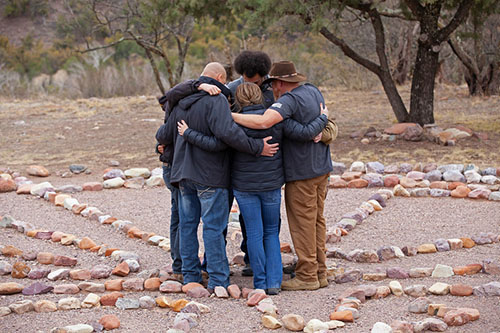Veterans Served by Wounded Warrior Project and Boulder Crest Foundation Share Impact of Posttraumatic Growth

Wounded Warrior Project® (WWP) proudly works to serve the many needs and challenges faced by the post-9/11 generation of wounded veterans. However, no one single organization can do it alone. Through partnerships with best-in-class veteran and military service organizations, WWP and its partners work to fill critical gaps in care, and augment the existing services provided for free by WWP.
Boulder Crest Foundation (BCF) is one such partner. WWP has proudly supported BCF’s Warrior PATHH (Progressive and Alternative Training for Helping Heroes) Program, which uses posttraumatic growth as a means of transformation so veterans and their families can live productive, fulfilling, and service-oriented lives at home.
Learn more about WWP’s community partnerships.
Mental health remains a critical area of focus for both BCF and WWP. Post-traumatic stress disorder (PTSD) is often called the signature wound of the Global War on Terror. According to the latest Annual Warrior Survey from Wounded Warrior Project® (WWP), nearly 1 in 4 warriors had suicidal thoughts in the last 12 months. Of the warriors who reported these suicidal thoughts, most (70%) had them in the last two weeks.
“The programs at Boulder Crest are the first of their kind and based on the science of posttraumatic growth,” said Ken Falke, founder and chairman of Boulder Crest Foundation. “Boulder Crest impacts thousands of warriors and family members a year through our programs and services. We are very grateful to Wounded Warrior Project for their continued investments in scaling our program beyond our walls.”
A graduate of the program is WWP warrior and Air Force veteran Alana O'Hagin, who was medically discharged in 2021 due to a small stroke from vertebral artery dissections.
“The complications affected my daily life to a great degree,” O’Hagin said. “After a very difficult year that included divorce, a medical separation, and health issues that impacted my daily life, I felt defeated, hopeless and as if I had lost my resilience and most cherished communities.”
O’Hagin said that her biggest hope was to work through her trauma, but also to gain tools to preserve through adversity.
“My biggest takeaway was the importance of struggling well,” said O’Hagin. “The act of building community and bonds with the other women of the program was powerful. We cried together, celebrated each of our wins however large or small, gained perspective from one another and just listened.”
The BCF program begins with a seven-day on-site training course, followed by 90-days of training delivered by BCF instructors through the myPATHH virtual platform. Warrior PATHH includes proven warrior-specific classes that teach the participants to make peace with their past, learn to live in the present, and create plans for their future.
“The science of posttraumatic growth measures and quantifies growth in five specific domains: new possibilities, deeper relationships, personal strength, appreciation for life, and spiritual and existential change,” said Falke. “The programs at Boulder Crest facilitate growth across the board in these domains, all which help increase quality of life. We believe that the true oppositive of suicide is living a great life.”
The focus and intensity of the program left a very strong impression on O’Hagin, who has worked in healthcare for over 10 years.
“I still talk about and feel the impacts of the Warrior PATHH program,” said O’Hagin. “It was brutally honest with an emphasis on forward life progression. We learned how to use the set of skills we were taught and given in the military to our advantage in leading a life with closer personal connections, greater appreciation for life, and a stronger sense of personal growth. The program exceeded my expectations. I couldn't believe that in seven days my perspective, resolve, and mental strength were so much stronger.”
Learn more about Boulder Crest Foundation and how the Warrior PATHH program is changing lives.
Contact: Mattison Brooks — Communications Specialist, mbrooks@woundedwarriorproject.org, 202.969.1120
About Wounded Warrior Project
Since 2003, Wounded Warrior Project® (WWP) has been meeting the growing needs of warriors, their families, and caregivers — helping them achieve their highest ambition. Learn more.